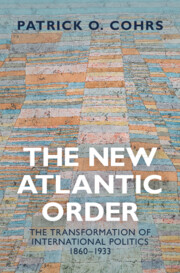Book contents
- The New Atlantic Order
- The New Atlantic Order
- Copyright page
- Dedication
- Contents
- Acknowledgements
- Abbreviations
- Maps
- Introduction
- Part I Inevitable Descent into the Abyss?
- Part II The Greatest War – and No Peace without Victory
- Part III Reorientations and Incipient Learning Processes
- 10 Towards a Progressive Atlantic Peace of the Victors
- 11 The Search for a New Equilibrium – and an Atlantic Concert
- 12 The Search for Security and an Atlantic Alliance of the Victors
- 13 A New Beginning?
- Part IV No Pax Atlantica
- Epilogue The Political Consequences of the Peace
- Bibliography
- Index
13 - A New Beginning?
German Pursuits of a Wilsonian “Peace of Justice” and First Steps towards an Atlanticist Foreign Policy
from Part III - Reorientations and Incipient Learning Processes
Published online by Cambridge University Press: 22 April 2022
- The New Atlantic Order
- The New Atlantic Order
- Copyright page
- Dedication
- Contents
- Acknowledgements
- Abbreviations
- Maps
- Introduction
- Part I Inevitable Descent into the Abyss?
- Part II The Greatest War – and No Peace without Victory
- Part III Reorientations and Incipient Learning Processes
- 10 Towards a Progressive Atlantic Peace of the Victors
- 11 The Search for a New Equilibrium – and an Atlantic Concert
- 12 The Search for Security and an Atlantic Alliance of the Victors
- 13 A New Beginning?
- Part IV No Pax Atlantica
- Epilogue The Political Consequences of the Peace
- Bibliography
- Index
Summary
Chapter 13 reappraises the difficult attempts made by those who sought to break with Wilhelminian power politics and develop both a western-orientated peace agenda and a new, progressive foreign policy on behalf of the defeated German state and, eventually, the fledgling Weimar Republic. It argues that while the core aim of the new protagonists, the social democratic leaders Friedrich Ebert and Philipp Scheidemann and the new republic’s first foreign minister Ulrich von Brockdorff-Rantzau, was to negotiate a lenient Wilsonian “peace of justice” they also came to develop forward-looking Atlanticist policies designed to integrate a republican Germany into a reconfigured Atlantic order – and the League of Nations. It elucidates the prevalent maxims and assumptions of the new German peace agenda that was elaborated after the armistice. And it examines how far the new German key actors had drawn more far-reaching lessons from the war and Germany’s catastrophic yet only partially acknowledged defeat – and how far the new priorities and conceptions they advanced went beyond tactical considerations and could actually contribute to the creation of a peace-enforcing Atlantic order after the Great War.
Keywords
- Type
- Chapter
- Information
- The New Atlantic OrderThe Transformation of International Politics, 1860–1933, pp. 534 - 570Publisher: Cambridge University PressPrint publication year: 2022

